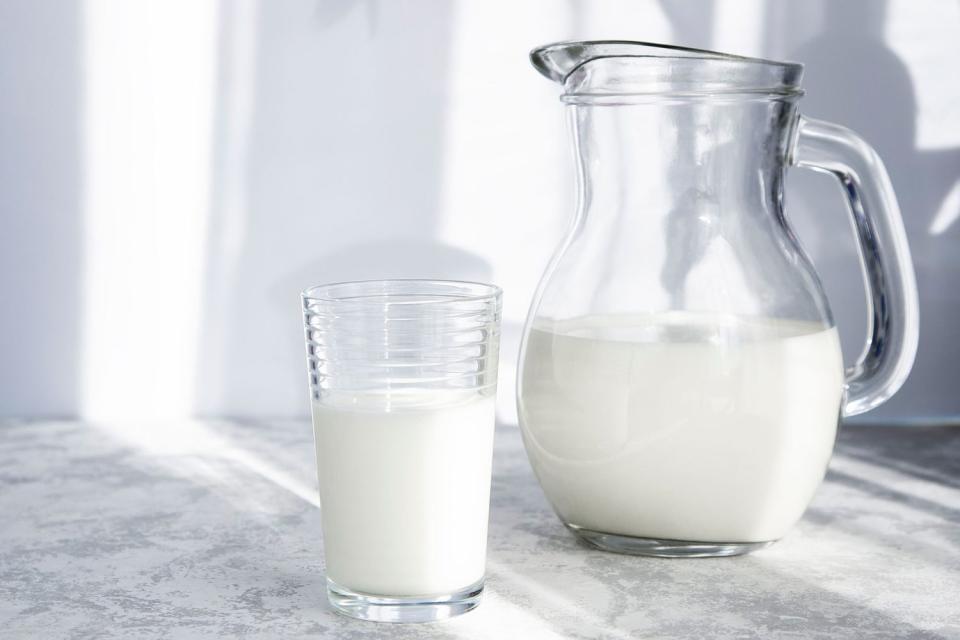Is Soy Milk Good for You?
Dotdash Meredith and Yahoo Inc. may earn commission or revenue on some items through the links below.
Once upon a time, soy milk was the alt milk to drink, but negative claims dented its fame and its reputation ultimately went sour. Since then, other tasty (and less divisive) plant-based milks have entered the scene, further pushing soy milk to the wayside. Today, soy milk is still one of most confusing products in the food world. First it was good, then it was bad—so what's the deal? As it turns out, it might be time to forget what you know about soy milk, as it's one of the healthiest alt milks you can drink.
Related: Here's How Different Types of Milk Impact Your Hormones
The Soy Milk Debate, Explained
Let's take it back to the 1980s, when soy milk first stole the show. At the time, soy milk gained recognition as one of the first mainstream plant-based milks. It was also popular for its non-dairy nature, as it's ideal for people with lactose intolerance, explains Megan Byrd, R.D., registered dietitian and founder of The Oregon Dietitian. Plus, soy products in general were touted as "perfect" health foods, as soy offers an impressive roster of nutrients, including fiber, iron, and calcium—just to name a few. (In fact, soy milk holds even more protein than cow's milk, according to the Journal of Functional Foods.) It also didn't hurt that soy milk has a wonderfully smooth and creamy texture, making it "a great replacement in recipes that call for milk, like creamy sauces [and] smoothies," explains Byrd. Needless to say, soy milk was quite the superstar.
However, by the early 2000s, the story flipped. Studies started reporting that soy milk increases the risk for cancer, especially breast cancers, says Byrd. Other studies claimed that soy milk may cause other conditions, like thyroid issues and dementia. Specifically, these effects were associated with compounds called isoflavones, which are found in soy milk in high amounts. Isoflavones are phytoestrogens, or plant estrogens, meaning they act like the hormone estrogen, according to Harvard T.H. Chan School of Public Health. And since high estrogen levels have been associated with some breast cancers, as well as thyroid function and cognitive decline, these findings eventually damaged soy milk's reputation.
But there was a catch: For starters, the studies in question failed to find hard, solid link between soy and estrogen-related health issues. There were also many factors to consider, including the type of studies involved. For example, "the initial studies on soy milk were done on rodents, who process soy very differently than humans," shares Byrd. Moreover, animal studies use very high doses of isoflavones—much higher than those seen in humans. All of this to say that such research is now considered outdated and inconclusive, though the uncertainty it sparked still remains.

Elena Medoks / Getty Images
Is Soy Milk Healthy?
Over the past few decades, scientists have continued to study its effects on the human body. More current research has found that isoflavones can actually reduce the risk of cancer, says Byrd, as well as other issues like osteoporosis and thyroid function. And as a 2021 scientific review of more than 400 studies notes, there's little evidence that soy isoflavones significantly alter estrogen levels in humans.
That being said, soy milk might deserve an apology. "Soy milk is incredibly healthy," says Byrd. "It contains natural flavonoids, which are known to be anti-inflammatory and reduce cancer risk." (Flavonoids, by the way, are antioxidant compounds found in plants.) Soy milk is also typically fortified with calcium and vitamin D—a nutrient essential for optimal calcium absorption—which is excellent news if you're lactose intolerant or allergic to dairy.
What to Look for When Buying Soy Milk
Ready to give soy milk a second chance? You'll be glad to know that it's still widely available at the grocery store. To find the most nutritious choice, "look for soy milk that only [contains] water, soybeans, and added vitamins and minerals," suggests Byrd. In general, such a milk is considered healthier, as it will be free of excess refined sugar and artificial flavors, says Byrd. On that note, choose a soy milk that's labeled as "unsweetened," as this indicates it contains no added sugars and flavors.
But what if you do want a flavored and/or sweetened soy milk? The unsweetened version is still your best bet, as you can easily flavor it at home. For example, you can add a splash of high-quality vanilla extract for extra flavor or stir in a natural sweetener, like honey or maple syrup. Another option is to make your own chocolate soy milk (or hot cocoa) with natural cocoa powder or dark chocolate. This way, even if you do add extra ingredients, you'll know precisely what's in your soy milk.

